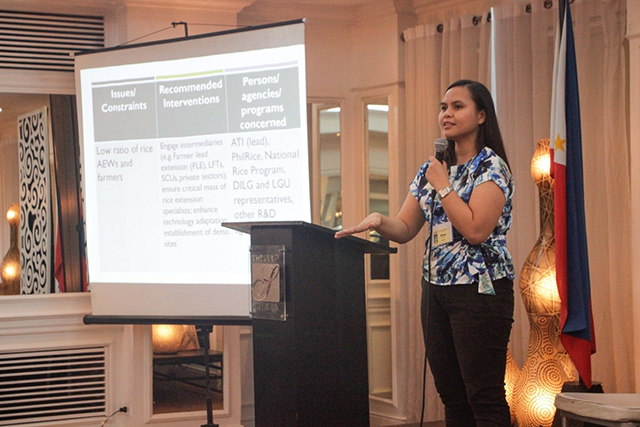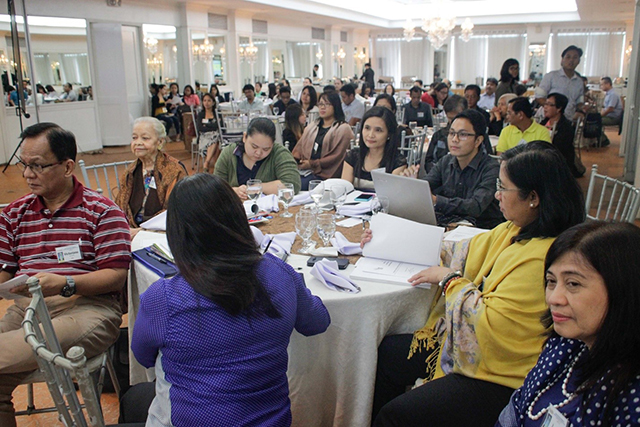 Various stakeholders from the rice industry gathered in a policy seminar-workshop to discuss issues and recommendations in the country’s quest for rice security, Sept. 30.
Various stakeholders from the rice industry gathered in a policy seminar-workshop to discuss issues and recommendations in the country’s quest for rice security, Sept. 30.
With the theme, Toward a rice-secure Philippines: Identifying key priority government interventions in 2017-2022, the activity aimed to identify strategies that could help attain the Department of Agriculture’s three-point agenda under the leadership of Sec. Emmanuel “Manny” Piñol. This includes: fast and effective agricultural technology transfer to farmers; easy access to financing; and efficient marketing for farmers’ produce.
Raymond Patrick Cabrera, senior agriculturist of the DA-Bureau of Agricultural Research, presented the current rice research and development projects implemented through partnerships and collaborations with international, national, and local R&D institutions.
Cabrera also presented the Rice Research Development and Extension Agenda and Programs (RDEAP) as a reference material “to guide the path towards a competitive, sustainable, and resilient rice industry.”
On the rice extension session, Dr. Eliseo Ponce, former professor of research and extension management of the Visayas State University, talked about issues, challenges, and opportunities of the rice extension system in the Philippines. He recommends the national government to identify structural or organizational barriers to an effective rice extension system and institute the corresponding policy solutions.
 Participants of the forum also learned about the Fostering Agriculture and Rice Marketing by Improved Education and Rural Advisory Services (FARMERS) project of the Better Rice Initiative for Asia (BRIA) Philippines.
Participants of the forum also learned about the Fostering Agriculture and Rice Marketing by Improved Education and Rural Advisory Services (FARMERS) project of the Better Rice Initiative for Asia (BRIA) Philippines.
According to Nomer Esmero, BRIA PH’s senior national coordinator, FARMERS is a public-private partnership initiative that includes efforts for better rice production, better market linkage, and documentation of project insights and good practices as reference of partner agencies at national and regional levels.
Meanwhile, Dr. Roehlano Briones, senior research fellow of the Philippine Institute for Development Studies (PIDS), identified factors for rice marketing inefficiency in the country. To solve this issue, he recommends the establishment of wholesale palay markets that “should come as a package” by introducing palay grades and standards; weighing, drying, and storage facilities; and compulsory warehouse receipts among other features.
Also part of the event was the launch of the book Competitiveness of Philippine Rice in Asia authored by socio-economists from PhilRice and the International Rice Research Institute (IRRI). The book is a product of the study Benchmarking the Philippine rice economy relative to major rice-producing countries in Asia.
Outputs of the workshop sessions in research for development (R4D), marketing and trade, rice extension system, and support services for farmers, will be presented to Sec. Piñol by the Socioeconomics Division of PhilRice that organized the policy forum.
“For us to make an impact on the lives of our farmers economically, we need to bridge them to our policymakers for them to better understand our farmers’ dilemmas. To do this, we need to craft and submit relevant policy papers to support legislation,” said Dr. Sailila Abdula, acting executive director of PhilRice.
R4D and rice security was the theme of the 29th National R&D Conference where Abdula presented the new strategic plan of the Institute anchored on its vision of a rice secure Philippines.




